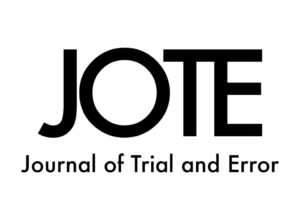JOTE ~ The Journal Of Trial And Error
 The Journal of Trial and Error aims to close the gap between what is researched and what is published. In scientific practice, trial and error is a fundamental process of learning and discovery. Therefore, we want to make public the lessons of the struggles in research. We are convinced about the productive role of errors, and so we aim to publish answers to the question “what went wrong?”, as well as problematising this question by reflecting on what failure means in science. You can read our manifesto to learn further about our goals, and the benefits of publishing errors.
The Journal of Trial and Error aims to close the gap between what is researched and what is published. In scientific practice, trial and error is a fundamental process of learning and discovery. Therefore, we want to make public the lessons of the struggles in research. We are convinced about the productive role of errors, and so we aim to publish answers to the question “what went wrong?”, as well as problematising this question by reflecting on what failure means in science. You can read our manifesto to learn further about our goals, and the benefits of publishing errors.
From the Manifesto
We state that …
Trial and Error is the elementary process in Science by which knowledge is acquired. We differentiate between two types of scientific Trial and Error processes:
– Methodological errors in a practical sense, driving improvement in the understanding and application of techniques. These errors are here understood in a broad sense, those that go beyond the learning of the individual researcher and have an impact at the scale of the scientific community.-
Conceptual flaws, arising from hypothesis being confronted with conflicting observations. When the initial hypotheses are inappropriate in the face of empirical evidence, scientists improve or reject theoretical frameworks by developing alternative theses aimed at increasing empirical adequacy. Not only hits (positive results), but also misses (negative results) are key to scientific progress.
We identify three core problems in today’s Science. Namely, …
… a public image of Science based on breakthrough discoveries, fascinating images, and clear results. This reputation comes at a cost. Both scientists themselves, as well as philosophers, sociologists and historians of science have increasingly been highlighting the importance of science in the making. A more faithful picture of Science, the one of practices and fine-tuning methodologies, seems to be at odds with the unrealistic public image of big-discovery Science.
… a gap between what is published and what is researched. We know positive publication bias pressures scientists to conceal methodological mistakes and discard research containing negative findings, threatening proper interpretation. In the face of failed research —outcomes of Science that do not meet the initial aim of the individual researchers— scientists have two options at hand: not publishing or framing the results as productive by, for example, adding ad-hoc hypotheses in a potentially inadequate manner. This point is a consequence of the expectations of big-discovery Science and the publish-or-perish politics of this Science.
… a replication crisis. Since scientists validate their results in terms of replicability, the present-day situation of unreplicable experiments is a serious problem. Debate on this replication crisis has focused on the misuse of statistics by scientists, on methodological carelessness, or theoretical inappropriateness. Only a few venues are attentive to the potential harm.
[…] The complete Manifesto: https://www.jtrialerror.com/the-manifesto-for-trial-and-error-in-science/
URL Journal: https://www.jtrialerror.com/
Noam Chomsky: Trump Is Consolidating Far-Right Power Globally
 It is no easy task to make sense of U.S. foreign policy in the current era. Trump is wildly unpredictable and lacks any semblance of a coherent view of world affairs, appearing to believe that all it takes is “the art of the deal” to turn “enemies” into friends. Meanwhile, since Trump’s rise to power, the end of U.S. hegemony has come into sight.
It is no easy task to make sense of U.S. foreign policy in the current era. Trump is wildly unpredictable and lacks any semblance of a coherent view of world affairs, appearing to believe that all it takes is “the art of the deal” to turn “enemies” into friends. Meanwhile, since Trump’s rise to power, the end of U.S. hegemony has come into sight.
In the exclusive Truthout interview below, renowned public intellectual Noam Chomsky — one of the world’s most astute critics of U.S. foreign policy in the postwar era — sheds considerable light on the current state of U.S. foreign policy, including Trump’s relations with the leaders of North Korea, Russia and China, as well as his so-called “Middle East Peace Plan.”
C.J. Polychroniou: Noam, in 2016 Trump called U.S foreign policy “a complete and total disaster,” claiming that previous administrations in the post-Cold War era were guided by unrealistic expectations that damaged America’s national interests. Since taking office, he has withdrawn the country from a series of international agreements, demanding that countries pay for U.S. protection, and seeking to advance U.S economic interests through tariffs and protectionism. These moves have led many analysts to speak of a new era in U.S. relations with the world. What’s your own take on Trump’s foreign policy?
Noam Chomsky: One of the most appropriate comments I’ve seen on Trump’s foreign policy appeared in an article in The New Republic written by David Roth, the editor of a sports blog: “The spectacle of expert analysts and thought leaders parsing the actions of a man with no expertise or capacity for analysis is the purest acid satire — but less because of how badly that expert analysis has failed than because of how sincerely misplaced it is … there is nothing here to parse, no hidden meanings or tactical elisions or slow-rolled strategic campaign.”
That seems generally accurate. This is a man, after all, who dismisses the information and analyses of his massive intelligence system in favor of what was said this morning on “Fox and Friends,” where everyone tells him how much they love him. With all due skepticism about the quality of intelligence, this is sheer madness considering the stakes.
And it continues, in ways that are almost surreal. At the recent G20 conference, Trump was asked about Putin’s statement that Western liberalism is obsolete. Trump assumed he must be talking about California: Western liberalism. Putin “may feel that way,” Trump responded: “He sees what’s going on. And I guess, if you look at what’s happening in Los Angeles, where it’s so sad to look; and what’s happening in San Francisco and a couple of other cities which are run by an extraordinary group of liberal people.” Read more
Patrice Lumumba’s Independence Day Speech, June 30, 1960
Men and women of the Congo,
Victorious fighters for independence, today victorious, I greet you in the name of the Congolese government. All of you, my friends, who have fought tirelessly at our sides, I ask you to make this June 30, 1960, an illustrious date that you will keep indelibly engraved in your hearts, a date of significance of which you will teach to your children, so that they will make known to their sons and to their grandchildren the glorious history of our fight for liberty.
For this independence of the Congo, even as it is celebrated today with Belgium, a friendly country with whom we deal as equal to equal, no Congolese worthy of the name will ever be able to forget that is was by fighting that it has been won [applause], a day-to-day fight, an ardent and idealistic fight, a fight in which we were spared neither privation nor suffering, and for which we gave our strength and our blood.
We are proud of this struggle, of tears, of fire, and of blood, to the depths of our being, for it was a noble and just struggle, and indispensable to put an end to the humiliating slavery which was imposed upon us by force.
This was our fate for 80 years of a colonial regime; our wounds are too fresh and too painful still for us to drive them from our memory. We have known harassing work, exacted in exchange for salaries which did not permit us to eat enough to drive away hunger, or to clothe ourselves, or to house ourselves decently, or to raise our children as creatures dear to us.
Read more: https://sfbayview.com/patrice-lumumba
Capitalist Workplaces Set Bosses Up To Be Authoritarian Tyrants
Long before the growing interest in economic inequality facing contemporary capitalist societies, radical thinkers and union organizers were concerned about the authoritarian governance in workplaces. Unfortunately, this concern seems to have taken a back seat in political philosophy during the present era. Elizabeth S. Anderson, a professor of philosophy and women’s studies at the University of Michigan, is seeking to remedy this with her trenchant analyses of the coercive and hierarchical nature of capitalist firms and corporations. Her book Private Government offers an important reminder that bosses tend to be dictators and that workers’ lives are essentially at the mercy of private government.
C.J. Polychroniou: In your book Private Government, you analyze the different facets of modern workplaces and argue that firms and corporations operating under so-called “free market” norms and arrangements are actually coercive and hierarchical in nature, and rule over workers’ lives as authoritarian governments tend to do. Can you elaborate a bit on these highly challenging ideas, as most people don’t seem to view workplaces as dictatorships?
Elizabeth S. Anderson: Look at the organizational chart of any firm: You will see a hierarchy of offices, with subordinates reporting to their bosses, and bosses issuing orders to subordinates that must be obeyed on pain of sanctions such as getting fired, demoted, harassed or denied decent hours. That’s all it takes to make a little government — the power to issue orders to others, backed by threats of punishment. If the workplace is a government, we can ask, what is the constitution of that government? The answer, in nearly all cases where workers lack union representation, is that the constitution of workplace government is a dictatorship. Workers don’t get to elect their bosses. They don’t have a right to participate in the firm’s decision-making about the terms and conditions of their work. For the most part, they have little effective recourse if their bosses abuse them, other than to quit.
Workers even lack the power to hold their bosses to account for a wide range of abuses at work — even when those abuses are illegal, such as sexual harassment and wage theft. The scale of wage theft — effected by forcing workers to work off the clock, work overtime without extra pay and numerous other scams — is vast. It exceeds the sum total of all other thefts in the U.S. The vast majority of workers who are sexually harassed face illegal retaliation at work for complaining. So most keep silent. More and more, employees are forced to sign mandatory arbitration agreements, which strip them of their right to have their case be heard by a neutral judge following legal procedures. Instead, they must go to an arbitrator chosen by their employer, who is bound by no procedures, and knows that the arbitration contract will not be renewed if they render too many judgments in favor of the worker. No wonder workers under mandatory arbitration are far less likely to win their cases, and when they win, receive far less compensation than workers who sue their employer in court. It’s a recipe for mass abuse. While many workers — particularly those in management or with rare skills — get decent treatment, millions of ordinary workers suffer under awful working conditions, low pay, unstable hours, and subjection to discrimination, wage theft and other illegal treatment.
Dictatorial employer control over workers doesn’t even end when workers are off-duty. The default rule in the U.S. is “employment at will.” This means that, with a few exceptions (mostly having to do with discrimination), employers are legally entitled to fire, demote and harass workers for any reason or no reason at all. This rule opens the door to punishing workers for things they do while off-duty. Many workers have been fired because their boss disapproves of their choice of sexual partner, support for candidates and political causes the boss doesn’t like, unconventional gender presentation, recreational use of marijuana on days off and other personal decisions. When a Coke worker can be fired for drinking Pepsi at lunch, it’s easy to see that the scope of employer control over workers’ lives is nearly unlimited. Read more
Rosa Luxemburg Internet Archive
 “Freedom only for the supporters of the government, only for the members of one party – however numerous they may be – is no freedom at all. Freedom is always and exclusively freedom for the one who thinks differently. Not because of any fanatical concept of ‘justice’ but because all that is instructive, wholesome and purifying in political freedom depends on this essential characteristic, and its effectiveness vanishes when ‘freedom’ becomes a special privilege.” – The Russian Revolution
“Freedom only for the supporters of the government, only for the members of one party – however numerous they may be – is no freedom at all. Freedom is always and exclusively freedom for the one who thinks differently. Not because of any fanatical concept of ‘justice’ but because all that is instructive, wholesome and purifying in political freedom depends on this essential characteristic, and its effectiveness vanishes when ‘freedom’ becomes a special privilege.” – The Russian Revolution
The Library: https://www.marxists.org/archive/luxemburg/index.htm
Dutch Prize Papers

HCA 32 / 1845.1: A box with ship’s documents, court papers, ship’s journals, cash books and a wallet with a small French prayer book, seized in the 17th century during the Second and Third Anglo-Dutch Wars. Source: Sailing Letters Journal IV, Zutphen: Walburg Pers, 2011, 12; picture: Erik van der Doe
The Prize Papers are documents seized by British navy and privateers from enemy ships in the period 1652-1815. These papers are kept in the archive of the High Court of Admiralty in The National Archives in Kew (London). Approximately a quarter of the Prize Papers originates from Dutch ships. Apart from ship’s journals, lists of cargo, accounts, plantation lists and interrogations of crew members, this collection also contains approximately 38,000 business and private letters. The letters originate from all social strata of society and most of them never reached their intended destination.
Research
The huge variety of the Prize Papers makes it suitable for different types of research. It means that the Prize Papers can be used for a wide range of research topics, for example, for developments in language and dialect, trade, material culture, social relationships and knowledge transfer from the 17th to the 19th centuries. A large international research project by the universities of Oxford and Birmingham led by Jelle van Lottum focused on the migration of sailors and the distribution of human capital, based on records of interrogations of crew members. This research was financed by the Economic and Social Research Council (2011-2016).
The Sailing Letters’ project carried out by the National Library of the Netherlands in 2004, introduced the Prize Papers to a broad group of Dutch researchers. Five Sailing Letters Journals were published between 2008 and 2013 to make this rich and versatile resource even more widely known.
Preservation and digitisation
The award at the end of 2015 of a substantial subsidy to Huygens ING by Metamorfoze, the national programme for the preservation of paper heritage, made it possible to preserve and digitise 144.000 pages of selected documents.
Go to: https://www.huygens.knaw.nl/dutch-prize-papers/
or: https://prizepapers.huygens.knaw.nl/




